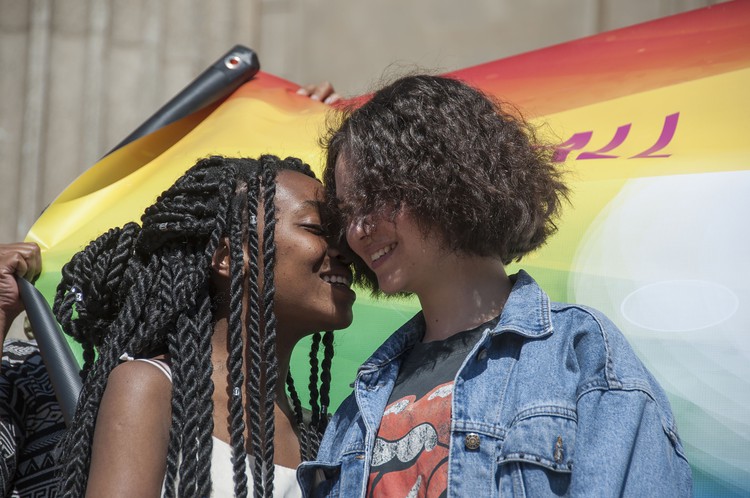Wits students stand up for gay rights
“We stand here in pride, in solidarity and in defiance with what it means to be in a positive, beautiful and queer relationship.”
Students at universities who identify with the LGBTQ+ community still face daunting challenges even though these institutions are viewed as liberal and progressive. This is according to Tish Lumos, the program coordinator for sexual orientation and gender identity advocacy at Wits University.
Lumos was addressing a group of students at the opening of Wits Pride 2017, an annual week long event to raise awareness of LGBTQ+ issues and to celebrate diversity at the university.
“Campus populations are just extensions of broader society and so we see that some people still carry a negative attitude towards those who are viewed as different,” said Lumos. A challenge, said Lumos, was that students attending university for the first time and “coming out” as gay or lesbian do not find the necessary support structures at the university. “That is why at Wits we started the Safe Zone project,” they said.
One of the main goals of the Safe Zone project is to help LGBTQ+ people at Wits feel safer. “Most of the time it’s just students coming to terms with the fact that they are coming out for the first time and they are feeling alone, feeling scared and they want to find others like them,” said Lumos. “I truly believe that everyone at the university can work together so that we can change spaces for the better.”
As part of the opening a Queer Wedding was held on the steps outside the Great Hall. Zanele Hlonwane and Juliet Magatanatos participated in a mock symbolic wedding. “We stand here in pride, in solidarity and in defiance with what it means to be in a positive, beautiful and queer relationship. And if that’s not worth celebrating I don’t know what is,” said Lumos as they officiated the ceremony.
Natasha [not her real name], a first year engineering student said that it was encouraging to see the LGBTQ+ people coming out and supporting each other at events like this because in the small community from which she’s from being lesbian is frowned upon. While staying in Johannesburg Natasha feels free to express her attraction to women, but hides her identity when she returns home for fear of being stigmatised.
A 2015 survey conducted by the Gauteng City-Region Observatory showed that only 56% of respondents felt that gays and lesbians deserve equal rights. This was a significant drop from the 2013 survey when 71% agreed with the statement. Even more worrying was that 14% of respondents agreed that it’s acceptable to be violent to gay and lesbian people.
Wits Pride 2017 will run from 21 to 25 August and will culminate with a Pride March at the Great Hall stairs on Friday.
CORRECTION: This article has been corrected following a request from Lumos to change their surname and gender.
Support independent journalism
Donate using Payfast

Don't miss out on the latest news
We respect your privacy, and promise we won't spam you.
Next: KPMG’s questionable behaviour goes beyond Gupta companies
Previous: Epileptic, asthmatic and on the streets
Letters
Dear Editor
The scriptures teach that we are to love one another, it does not teach that we must like everyone. The law says that same sex is legal it does not say that we must all be same sex attractive.
So many activities are dependent on what the law says. Many years ago there was a very profitable business in motor bike guards, as the law compelled all motor bikes over a certain cc to have these installed. When the law changed the business failed.
Currently in this country they seem to change the rules and laws applicable to number plates regularly the number plate business people thrive on this.
Now we have a law that says same sex is permissible and the same sex people are complaining that they are still not acceptable to society. Well the same sex people in America are complaining that they are not allowed to invade the space of the other sexes bathrooms. I am a man and I do not want women in my bathroom. My wife is a female and she does not want a man in her bathroom.
What does this all mean? It means that if you want acceptability you cannot rely on the law. Acceptability comes about by your actions, the things you do and the things you say, and how you treat others. If I am in a group of people among whom there are two who are publicly emotionally involved I remove myself from their company, irrespective of same sex or opposite sex as this is neither the time nor place to be making eyes at each other.
There are apparently four sexes in this world today, male, female, and female males and male females, with exceptions each one of them have during the course of their lives either felt 'unloved' and or 'unwanted'. This is normal. If one wishes to live in a world of normal people then one must live as normal people do, and this includes feeling unloved and unwanted at times.
Those who choose a multi-sex marriage accept the norm of being able to have their own children, those who do not make the choice of staying childless.
© 2017 GroundUp. 
This article is licensed under a Creative Commons Attribution-NoDerivatives 4.0 International License.
You may republish this article, so long as you credit the authors and GroundUp, and do not change the text. Please include a link back to the original article.

